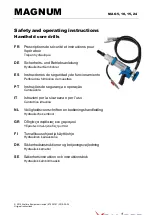
5
EN
www.napoleongrills.com
N415-0526 DEC 11.18
Gas Hook-Up Instructions
WARNING!
A fire will result if the gas supply hose makes contact with the underside of the grill or
drip pan.
Propane Cylinder Installation
: Cylinder Connection
: Ensure the gas regulator hose is kink free. Remove the
cap or plug from the cylinder fuel valve. Insert the black QCC1 regulator nipple onto the QCC1 fuel valve.
General Information
This Gas Barbecue is certified under Canadian and American National Standards, CSA 1.6-2015
and
ANSI
Z21.58-2015 respectively for Outdoor Gas Grills and should be installed to conform according to local
codes. In absence of local codes, install to the current CAN B149.1 Natural Gas and Propane Installation
Code in Canada or to the National Fuel Gas Code, ANSI Z223.1 in the United States.
If a rotisserie motor is used, it must be electrically grounded in accordance with local codes or, in absence
of local codes, with the current CSA C22.1
Canadian Electrical Code in Canada or the National Electrical
Code,
ANSI/NFPA 70
in the United States.
WARNING
: This product can expose you to chemicals including lead and lead compounds, which are
known to the State of California to cause cancer, and chemicals including di-n-butyl phthalate, which are
known to the State of California to cause birth defects or other reproductive harm. For more information
go to
www.P65Warnings.ca.gov
.
Propane Cylinder Specifications
WARNING!
If these instructions are not followed exactly, a fire causing death or serious injury may
occur.
WARNING!
Do not store a spare propane cylinder on the shelf beneath the barbecue.
If the gas grill is being supplied with propane from a portable cylinder, a regulator specified by the
manufacturer must be used. The regulator must supply a pressure of 11 inches water column (0.39 PSI) to
the gas grill and have a QCC1 type fitting. Cylinders to be used with this unit must be supplied with a QCC1
cylinder valve. A QCC1 cylinder has a positive seating connection, which will not allow gas flow until a
positive seal has been achieved. It is also equipped with an excess flow device. In order to attain full flow
to the grill, the valves must be in the off position when the cylinder valve is turned on.
A dented or rusty cylinder may be hazardous and should be checked by your propane supplier. Never
use a cylinder with a damaged valve. Use only a propane supply cylinder constructed and marked in
accordance with the specifications for LP-gas cylinders of the National Standard of Canada, CAN/CSA-b339,
Cylinders, Spheres and Tubes for Transportation of Dangerous Goods; and Commission, as applicable or
the Specifications for LP-Gas Cylinders of the U.S. Department of Transportation (D.O.T.). Cart models have
been designed for use with a 20 lb (9.1 kg) size propane cylinder only (not supplied).
The propane cylinder must be provided with a cylinder connection device compatible with the connection
for outdoor cooking appliances. The propane cylinder must be provided with a shut-off valve terminating
in a propane cylinder valve type QCC1, and a safety relief device having direct communication with the
vapor space of the cylinder. The cylinder supply system must be arranged for vapor withdrawal and the
cylinder shall include a collar to protect the cylinder valve. The cylinder shall incorporate a listed OPD
(overfill protection device). Do not store a spare LP-gas cylinder under or near this appliance. Never fill the
cylinder beyond 80 percent full. If the preceding information is not followed exactly, a fire causing death
or serious injury may occur.
!
!
!
N415-0526 DEC 11.18.indd 5
12/11/2018 12:11:46 PM






































